ARTICLE AD BOX

 BBC
BBC
Standing on a podium in a Florida convention centre on the night of the election, a row of American flags behind him and a jubilant crowd looking on, Donald Trump declared: “Many people have told me that God spared my life for a reason, and that reason was to save our country and to restore America to greatness.”
This was one of the most striking themes of his election campaign - that he had been chosen by God. Yet even before the attempt on his life on 13 July in Butler, Pennsylvania, millions of Americans already felt guided by their faith to support the former, and now future, president.
Some cast the election in an apocalyptic light and likened Trump to a Biblical figure.
Last year, on the Christian show FlashPoint, TV evangelist Hank Kunneman described “a battle between good and evil”, adding: “There's something on President Trump that the enemy fears: it's called the anointing.”

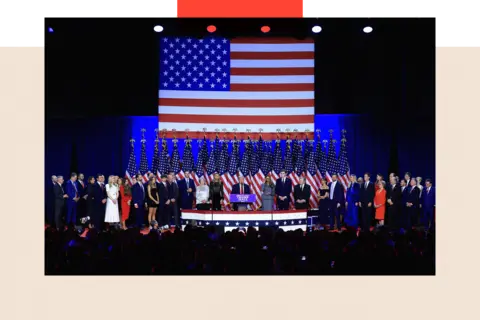 EPA
EPA
Donald Trump delivered his victory speech to a jubilant crowd
Jim Caviezel, an actor who played Jesus in Mel Gibson’s The Passion of the Christ, proclaimed, albeit jokingly, that Trump was “the new Moses”. Then, in the months leading up to the election, many of his supporters referred to him as a “saviour”.
The question is why. What makes so many see this man, who isn’t known to have an especially strong faith, as sent from God?
And what does that say about Christianity more broadly in a country where the numbers of churchgoers is in rapid decline?
‘All of us have sinned’
Reverend Franklin Graham is one of America’s best-known evangelists and the son of Billy Graham, arguably its most famous preacher. He is one of the Trump believers, convinced there is no doubt that the president-elect was chosen for this mission by God.
“The bullet that went through his ear missed his brain by a millimetre, and his head turned just at the last second when the gun was fired,” he says. “I believe that God turned his head and saved his life.”
The questions asked about Trump’s character - including accusations of sexual misconduct, and his alleged affair with adult film star Stormy Daniels and associated hush-money trial - don't dim Mr Graham’s view.
“Remember when Jesus told the crowd, ‘Let the one without sin cast the first stone’ and that slowly, the entire audience began to disappear? All of us have sinned.”

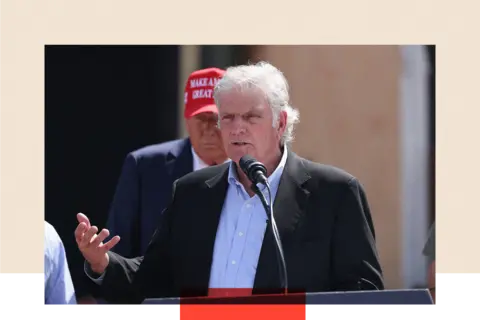 Getty Images
Getty Images
Franklin Graham spoke alongside Donald Trump during the 2024 election campaign
Part of the reason some Christians may find it easier to look past questions of character is that during Trump’s first term in office he delivered on a particular promise: to appoint anti-abortion judges to the US Supreme Court.
Mr Graham points to this as evidence that the president-elect is a man of integrity.
“This is a big win for Christians, for evangelicals,” he says. “We believe the president will defend religious freedom where the Democrats would not.”
The selection of Mike Huckabee as ambassador to Israel is already a hint that faith might shape some foreign policy. US evangelicals including Huckabee are among the country’s most fervent supporters of Israel.
Many of them believe that Jews should populate the whole of the area of biblical Israel, including what is now the occupied West Bank and Gaza, in order to precipitate events leading to the Second Coming of Jesus Christ.
A religion in rapid decline
In the past Donald Trump had talked about having had a Presbyterian upbringing. But despite his strong support from Christians in last week’s election, he never tried hard to convince them in his most recent campaign that he was one of them.
“I think he realised it was going to be a bit of a stretch to argue that he himself is a religious man, but instead he adopted a quid pro quo approach,” says Robert Jones, founder and president of the Public Religion Research Institute (PRRI), which has long tracked religious trends in the US.
That approach centred on changes in demographics and dwindling numbers of churchgoers.

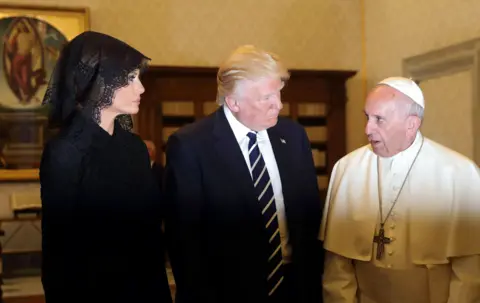 European Pressphoto Agency
European Pressphoto Agency
Pope Francis meets with President Trump and First Lady Melania Trump at the Vatican City in 2017
In the early 1990s, about 90% of US adults identified as Christians - a figure that had fallen to 64% earlier this decade, with a large increase in the number of those unaffiliated to any faith, according to data from Pew Research Center.
This, says Dr Jones, was something Trump was able to draw upon.
“Trump’s message was: ‘I know you're in decline, I know your numbers are waning. I know your children and grandchildren aren't affiliated with your Churches anymore, but if you elect me, I'm going to restore power to the Christian Churches.”’
Not all Christians in the US were won over, however. For some, their faith has guided them to precisely the opposite impression of Trump.
'Trump has demeaned and debased'
In recent months, from the pulpit of Bible Ways Ministries in Atlanta, Georgia, Reverend Monte Norwood has been sharing a very different message to that of Franklin Graham.
He, for one, was dismayed at last week’s election result.
“Trump has demeaned and debased just about anybody he could, from immigrants to minorities to women to those who are disabled,” he says.

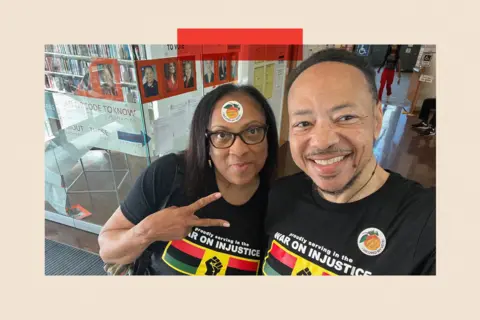 handout
handout
Monte Norwood and his wife Wanda after voting in Atlanta
“White conservative Republican Christianity that ignores character is just hypocritical."
He has long been opposed to the idea of a second Trump presidency, and he has voiced this on social media and through activism encouraging voter turnout - such as by helping other black voters to register to vote and access free rides to the polls.
“I am a Matthew chapter 25 kind of Christian - where Jesus said: ‘When I was hungry you fed me, when I was thirsty, you gave me something to drink.’”
In history: Christian voting patterns
PRRI’s research has looked into voting records in history, not just by religious practice and belief but also by race, and found that when it comes to political views, there has been a clear trend for decades.
“Almost without exception, white Christian groups have tended to vote Republican in presidential contests,” says Dr Jones. “Non-white Christian groups, non-Christian groups and religiously unaffiliated voters have tended to vote Democrat.”
This pattern dates back to the 1960s, he adds, when the Democratic party became associated with the civil rights movement and white Christian groups began migrating to the Republican Party.
Polling ahead of the 2024 election looking at voter intention suggested that for the most part this pattern held. “From our polling, we have a Republican party that is 70% white and Christian, and a Democratic party that's only a quarter white and Christian.”
According to the PPRI’s survey of 5,027 adults, white evangelical Protestant voters were the strongest backers of Trump over Harris by 72% to 13%. White Catholic voters also backed Trump, with 55% supporting him and 34% aligned with Harris. White “mainline” non-evangelical Protestants showed a similar split.
By contrast 78% black Protestants supported Harris while just 9% backed Trump, according to the survey. Harris’s backers also included Jewish-Americans, the religiously unaffiliated and other non-Christian Americans, according to the PPRI.

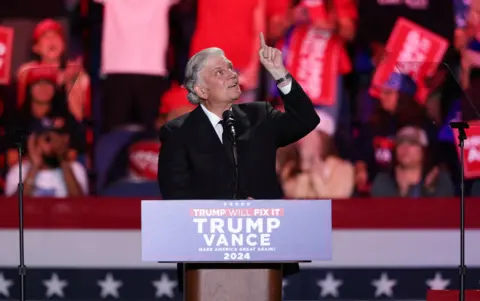 Reuters
Reuters
Rev Franklin Graham speaks during a rally in North Carolina ahead of the presidential election
When it came to the actual vote, there were signs of departures from familiar patterns.
The results from Michigan showed a clear lurch towards the Republican Party by Muslim voters in the state, likely the result of the Biden administration’s role in aiding Israel in its war in Gaza.
Analysis also shows that more Latino Catholics voted for Trump than expected, when previously they have tended to lean Democrat.
Economic hardship brought about by soaring inflation, among other factors, is likely to have resulted in “non-traditional” Republican voters being drawn to vote for Trump.
As for his appeal to traditionalist Christians, Dr Jones argues that there has been a faith component to the idea of “Making America Great Again”, with the promise of restoring the country's Christian character.
“His has been a campaign of grievance and loss and nostalgia,” argues Dr Jones, “and that includes nostalgia from a faith perspective.”
The future of faith in the US
For all his political strength, one thing that Trump cannot do is hold back the tide of demographic change in the US - including the move away from faith.
While the number who define themselves as “atheist” remains lower in the US than in most Western countries, those who say they are “religiously unaffiliated” is growing.
There is a generational component to that, along with the familiar trends of personal economics meaning that people have greater autonomy to move away from the accepted norms in their communities. But there are other reasons too.
A third of American atheists or agnostics say they disaffiliated from their childhood religion because of high-profile Church abuse scandals, according to a PPRI study.
In 2020 the Catholic Church released lists of living members of clergy in the US found to have been accused of abuses, including some linked to child pornography and rape. There were around 2,000 names.
Two years later, the Southern Baptist Conference collection of US Protestant Churches released a list of hundreds of Church leaders accused of child abuse between 2000 and 2019.
It shows the scale of the issue that Trump faces. Nevertheless, Franklin Graham is optimistic.
“Church attendance is not going to go up next week because President Trump has been elected - but what I think it does mean is that legislation that we might have seen coming down the road that that would make it very difficult for people of faith will not come,” he says, referring to the idea of more progressive legislation around, for example, abortion and gay and trans rights.
“He will protect people of faith, he will protect religious freedoms in this country. I don't talk about just Christian religious freedoms… [but] all people of faith.”
As to whether he is right, Americans can only watch and wait. But just as some are revelling in the promise of governance influenced by Christianity, others are undoubtedly nervous.
BBC InDepth is the new home on the website and app for the best analysis and expertise from our top journalists. Under a distinctive new brand, we’ll bring you fresh perspectives that challenge assumptions, and deep reporting on the biggest issues to help you make sense of a complex world. And we’ll be showcasing thought-provoking content from across BBC Sounds and iPlayer too. We’re starting small but thinking big, and we want to know what you think - you can send us your feedback by clicking on the button below.

 2 months ago
10
2 months ago
10
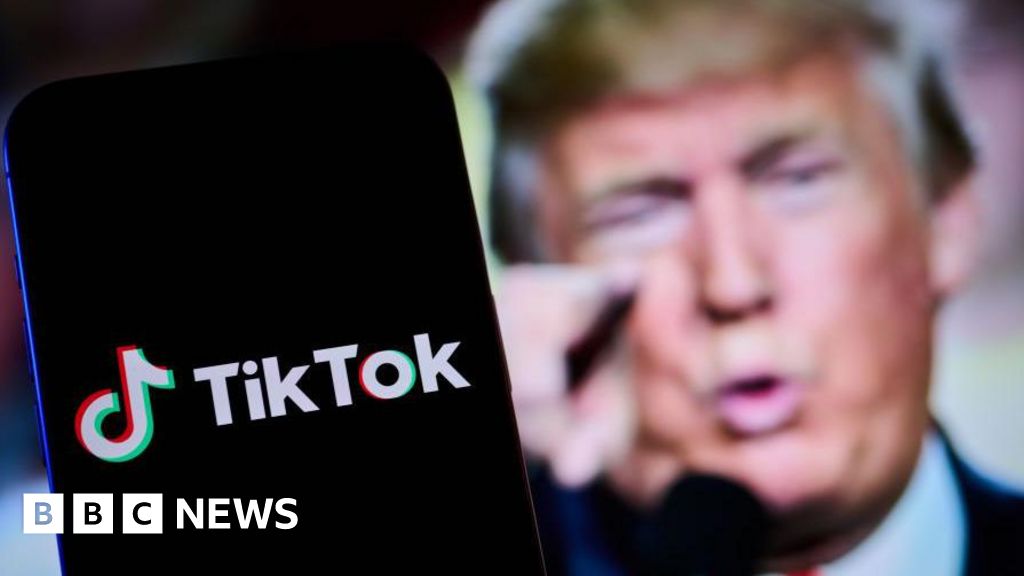

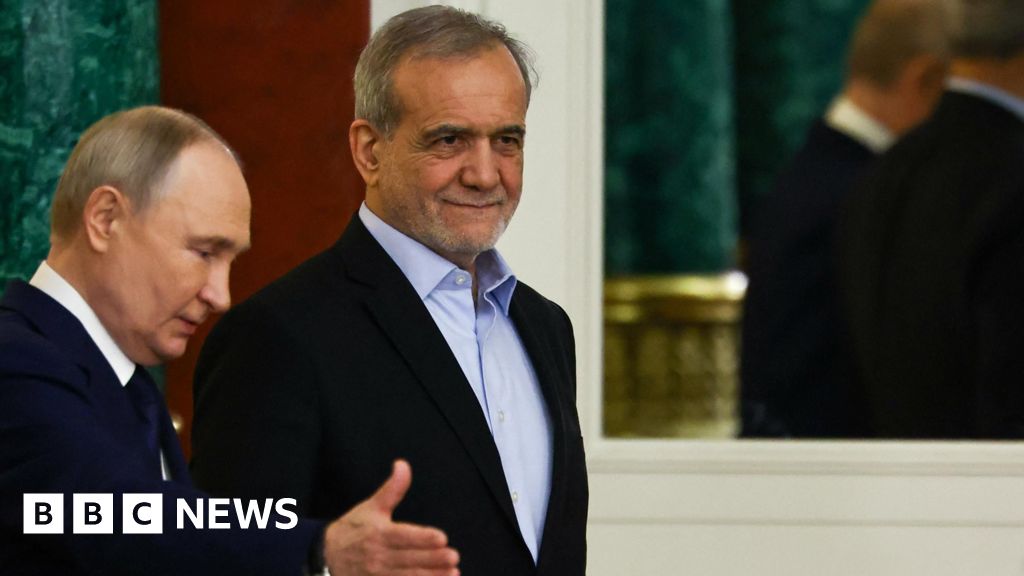





 English (US) ·
English (US) ·